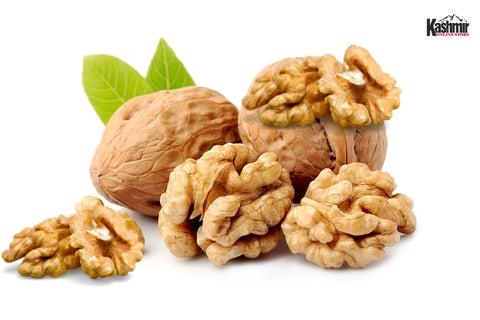What are Health Benefits of Walnuts.
Walnuts are nutrient-dense, containing omega-3 fats, antioxidants, and other compounds that may help protect against brain decline, heart disease, and cancer. Walnuts (Juglans regia) are a tree nut belonging to the walnut family. They originated in the Mediterranean region and Central Asia and have been part of the human diet for thousands of years. These nuts are rich in omega-3 fats and contain higher amounts of antioxidants than most other foods. Eating walnuts may improve brain health and prevent heart disease and cancer.
Walnuts are most often eaten on their own as a snack but can also be added to salads, pastas, breakfast cereals, soups, and baked goods. Walnuts have been touted as the ‘brain food’ because they resemble one with their furrowed appearance. The funny thing is that research has proved that consuming walnuts regularly does improve brain function.
Easy to add to the diet, they are very rich in nutritional content. They are better than most other nuts, even almonds because they have a high amount of polyunsaturated fat, vitamins, and minerals like potassium, iron, zinc, and magnesium. Fibre-rich and antioxidant-rich, walnuts trump all the other dry fruits on all accounts. Here are some of the benefits of walnuts. Add them as part of salads, over desserts or have them just as a snack. Walnuts provide healthy fats, fiber, vitamins, and minerals — and that’s just the beginning of how they may support your health.
Benefits Of Walnuts
Heart Health:

Walnuts are a great source of alpha-linolenic acid (ALA), an omega-3 fatty acid that is important for reducing inflammation. In fact, it is the only nut significantly high in these omega-3 fatty acids. Their anti-inflammatory compounds may reduce the risk of heart disease. Walnuts are rich in heart-healthy nutrients, particularly omega-3 fatty acids. These essential fats help lower LDL (bad) cholesterol levels and reduce inflammation in the arteries, thereby decreasing the risk of cardiovascular diseases such as heart attacks and strokes. Incorporating walnuts into your diet can contribute to improved heart health and overall wellbeing.
Brain Function:

The omega-3s and other antioxidants in walnuts are also great for your brain health. Healthy fats, polyphenols and vitamin E may help reduce or prevent inflammation and oxidative damage in your brain. But a research review shows this effect in non-human trials, so the results need to be confirmed by human research.
The same review included evidence suggesting that a diet with walnuts may improve brain function in older adults — including memory and mental processing speed. The review also discussed several studies indicating that many nutrients in walnuts may help decrease the risk of dementia, Alzheimer’s disease and other neurodegenerative diseases.
Weight Management:

Despite their relatively high calorie content, walnuts are rich in fiber, protein, and healthy fats, which promote satiety and help curb hunger cravings. Incorporating walnuts into a balanced diet can aid in weight management by keeping you feeling full and satisfied for longer periods, thus reducing overall calorie intake.
Walnuts are calorie-dense, but a small 2016 study suggests that your body absorbs 21% less energy from them than would be expected based on their nutrients. What’s more, eating walnuts may help regulate your appetite.
A well-controlled studyTrusted Source in 10 people with obesity found that drinking a smoothie made with about 1.75 oz (48 g) of walnuts once per day for 5 days decreased the participants’ appetite and hunger. This was in comparison to a placebo drink equal in calories and nutrients.
Support Good Body Composition
Because they are high in fibre, walnuts make you feel fuller much after you have consumed a handful. They are very rich in protein and help in healthy weight loss.
Good For Diabetes

Having walnuts can reduce the risk of developing Type II diabetes. They provide an excellent serving of protein, healthy fat and fibre. Since they do not add to the kilos, diabetics can have them without worry.
Boost Metabolism
A handful of walnuts can provide a boost to a sluggish metabolism. They are replete with essential fatty acids and help with digestion, growth and development and other metabolic processes.
Improve Fertility

Walnuts help in the production of sperms and improving the quality of sperms. They add to their vitality and mobility.
Good for Skin and Hair
Free radicals in the environment cause the most damage to the body. They are responsible for creating dryness and wrinkles in the skin. Walnuts help fight these free radicals. Regular consumption of walnuts helps in reducing the dark circles under the eyes.
Helpful in Pregnancy

For proper fetal growth, pregnant women should take in sufficient amounts of folate. Walnuts are rich in Vitamin B complex and help with the healthy growth of the fetus.
Helps in male reproductive health
Research suggests that amongst the many health benefits of walnuts, supporting sperm health and male fertility can be one of them. Studies done on animals suggest that eating walnuts can protect the sperm by reducing oxidative damage on their membranes. It is a given that extensive studies are required to confirm the nut’s role in improving male reproductive health. However, if you are someone who is concerned, you can always include a couple of walnuts in your daily diet.
Some ways to have walnuts (Akhrot)
Apart from the traditional way of enjoying the healthy snack one by one, there are some other ways to consume it as well:
- The crushed form can be used to coat fish or chicken.
- Can be roasted and added to your homemade trail mix.
- You can sprinkle some on salads.
- You can lightly roast them in your favourite stir-fry dish.
- You can finely dice them and add in some dips and sauces.

What nutrients do walnuts contain?
Although walnuts are high in calories, they are also high in nutrients. The healthy unsaturated fats in walnuts keep you feeling full for longer. Recent research suggests that the way fat is stored in walnuts prevents your body from holding onto all the calories. One study found that even though an ounce of walnut has 190 calories, only about 145 are usable. Walnuts also give you some of the iron and magnesium you need – about 10-14% of your daily needs.
What are the best ways to eat walnuts?
To maximize the health benefits, look for raw, unsalted walnuts. You can eat them alone as a snack or add them to your oatmeal in the morning. While walnuts have plenty of health benefits, it's still important to not overeat.
How many walnuts should I eat?
The 2020-2025 Dietary Guidelines for Americans recommends about 5 ounces of nuts, seeds and soy products per week for a 2,000 calorie diet. One serving (1 ounce) contains 2 grams of fiber, 4 grams of protein, 18 grams of fat, and about 190 calories.
